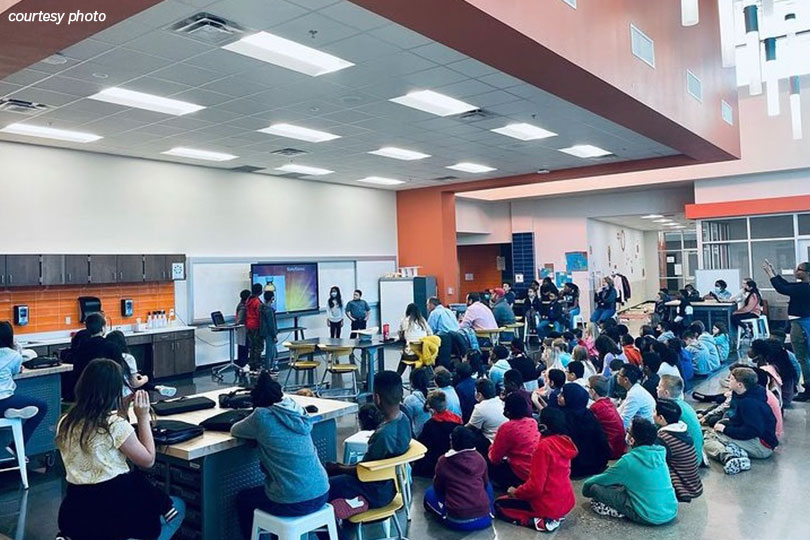By Jennifer Whitlock
Field Editor
When fifth grade STEM Academy students at Alma Martinez Intermediate School in Mansfield were assigned a garden design challenge over the fall semester, they weren’t sure where to start.
But some help from farmers and Texas Farm Bureau (TFB) soon had them on their way to creating garden plans for growing nutritious food on a budget.
“We were looking for a problem-based learning project that used relevant problems from today that were kid-friendly,” Brooke Stinnett, Martinez STEM Academy fifth grade math designer and teacher, said. “And we thought, ‘what could be more relevant than the increase in food prices?’”
The teachers came up with the “Frugal Foodies” project, where each group of students had $50 to design and implement a garden capable of feeding families. The aim was to find fruit and vegetable crops that would grow large quantities of produce in a small space that are compatible with the region’s climate.
Frugal Foodies was intended to be a semester-long project using grade-appropriate skills the students learned in their math, science, language arts and social studies classes.
There was just one small problem. While the teachers are subject area experts, they didn’t know much about agriculture or gardening.
That’s where TFB could help.
“I had no idea what to expect, and what we asked from Farm Bureau was a lot,” Stinnett said. “We asked them to be ‘consultants’ for our students, and the organization responded with true professionals, everyday farmers and ranchers who are experts in the field—literally.”
North Texas farmers met with students and advised them on different aspects of farming and growing crops.
TFB District 4 State Director John Paul Dineen and his wife, Heather, Denton County Farm Bureau members Garrett Spigner and Lewis Trietsch and Hill County Farm Bureau members Rodney and Susan Schronk gave feedback about each group’s plan.
After taking notes and incorporating the advice into their projects, the students presented again to the farmers in what Stinnett called a “Shark Tank-style” pitch using persuasive text and speeches.
The difference in the students’ knowledge and agricultural vocabulary was “night and day” after meeting with the farmers, she noted.
“If we could have had one consultation round and then a judge or two, we would’ve been totally thrilled. But Farm Bureau went way above and beyond and offered to come in and help launch the project,” she said. “That got the kids really excited because these are faces they don’t know doing jobs they’ve never really understood. The kids just really blossomed from there into little experts.”
After presenting their final garden designs to the farmers, each group of students presented their project to the other groups and a vote was held. At the end of one week, there were eight finalists headed to the final round, which was judged by TFB Associate Director of Organization, Educational Outreach Jordan Bartels, a horticulturist and the farmers.
The top three designs will be used to create the school’s first garden this semester, thanks in part to the teachers receiving a TFB Learning From the Ground Up garden grant.
The entire grade will participate in tilling the ground and planting a garden. Talks are ongoing about what to do with their anticipated harvest, including hosting a school farmers market or donating the food to the summer school meals program.
The students plan to grow okra, strawberries, beets, radishes, cantaloupe and bush beans.
“The learning will continue beyond designing a garden, too. It’s not just putting seeds in the ground. There’s so much that goes into it, and I think maybe our students never knew that and now they will,” she said. “I’m really, really happy for them to have that experience. I think it’s opening them up to careers that they never knew about before. We could not have brought this to the level that we did without Farm Bureau helping out.”

